Sandra Beasley's Blog, page 15
July 13, 2012
Two Artists to Know About
I am grateful every day to be part of a community of incredible artists.
 Josephine Durkin is in the home stretch of a Kickstarter campaign to raise $5K to create new work. We were on the same Odyssey of the Mind team in high school! We ran into each other at The Modern in Fort Worth, when I was in Texas for TCU's Ronald E. Moore Poetry Symposium. She has made a name for herself since our science & tech days--receiving an MFA in sculpture in Yale University and shows at places such as Virginia's Torpedo Factory and Texas A&M, where is currently on faculty. I love her work's emphasis on using "leftover studio residue," and I am proud to be a supporter (not to mention picking up a few rocking chairs in the process).
Josephine Durkin is in the home stretch of a Kickstarter campaign to raise $5K to create new work. We were on the same Odyssey of the Mind team in high school! We ran into each other at The Modern in Fort Worth, when I was in Texas for TCU's Ronald E. Moore Poetry Symposium. She has made a name for herself since our science & tech days--receiving an MFA in sculpture in Yale University and shows at places such as Virginia's Torpedo Factory and Texas A&M, where is currently on faculty. I love her work's emphasis on using "leftover studio residue," and I am proud to be a supporter (not to mention picking up a few rocking chairs in the process).
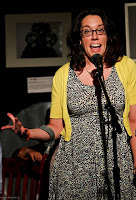 ...and then there is Natalie E. Illum: fellow American University MFA student, mothertongue co-founder, renowned slam poet, guide to many Mercuries retrograde, kick-ass chick. In one poem she diagnoses a man with the words "I knew you were coming. / Broken comet / on a two lane highway / heading straight / for my clavicle." You can find her on stages around DC at such venues as the Beltway Poetry Slam or Story League. You might also spot the two of us having a drink at the Diner. This video captures some of her grace, talent, and toughness.
...and then there is Natalie E. Illum: fellow American University MFA student, mothertongue co-founder, renowned slam poet, guide to many Mercuries retrograde, kick-ass chick. In one poem she diagnoses a man with the words "I knew you were coming. / Broken comet / on a two lane highway / heading straight / for my clavicle." You can find her on stages around DC at such venues as the Beltway Poetry Slam or Story League. You might also spot the two of us having a drink at the Diner. This video captures some of her grace, talent, and toughness.
Natalie Illum, Slam Poet from Christina Cauterucci on Vimeo.

 Josephine Durkin is in the home stretch of a Kickstarter campaign to raise $5K to create new work. We were on the same Odyssey of the Mind team in high school! We ran into each other at The Modern in Fort Worth, when I was in Texas for TCU's Ronald E. Moore Poetry Symposium. She has made a name for herself since our science & tech days--receiving an MFA in sculpture in Yale University and shows at places such as Virginia's Torpedo Factory and Texas A&M, where is currently on faculty. I love her work's emphasis on using "leftover studio residue," and I am proud to be a supporter (not to mention picking up a few rocking chairs in the process).
Josephine Durkin is in the home stretch of a Kickstarter campaign to raise $5K to create new work. We were on the same Odyssey of the Mind team in high school! We ran into each other at The Modern in Fort Worth, when I was in Texas for TCU's Ronald E. Moore Poetry Symposium. She has made a name for herself since our science & tech days--receiving an MFA in sculpture in Yale University and shows at places such as Virginia's Torpedo Factory and Texas A&M, where is currently on faculty. I love her work's emphasis on using "leftover studio residue," and I am proud to be a supporter (not to mention picking up a few rocking chairs in the process).  ...and then there is Natalie E. Illum: fellow American University MFA student, mothertongue co-founder, renowned slam poet, guide to many Mercuries retrograde, kick-ass chick. In one poem she diagnoses a man with the words "I knew you were coming. / Broken comet / on a two lane highway / heading straight / for my clavicle." You can find her on stages around DC at such venues as the Beltway Poetry Slam or Story League. You might also spot the two of us having a drink at the Diner. This video captures some of her grace, talent, and toughness.
...and then there is Natalie E. Illum: fellow American University MFA student, mothertongue co-founder, renowned slam poet, guide to many Mercuries retrograde, kick-ass chick. In one poem she diagnoses a man with the words "I knew you were coming. / Broken comet / on a two lane highway / heading straight / for my clavicle." You can find her on stages around DC at such venues as the Beltway Poetry Slam or Story League. You might also spot the two of us having a drink at the Diner. This video captures some of her grace, talent, and toughness. Natalie Illum, Slam Poet from Christina Cauterucci on Vimeo.
Published on July 13, 2012 11:48
July 6, 2012
Things I Wish I Hadn't Worried About
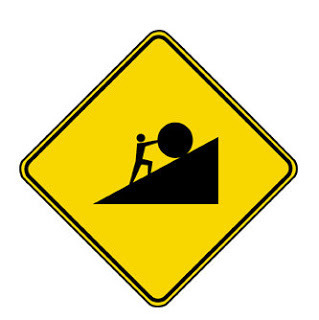 I love summer. I do. I love watermelon, and raw corn on the cob, and pulled pork BBQ. I love having time for live music again. I accept the trade-offs: calves speckled with mosquito bites, this sunburn on my shoulders after a Fourth of July baseball game.
I love summer. I do. I love watermelon, and raw corn on the cob, and pulled pork BBQ. I love having time for live music again. I accept the trade-offs: calves speckled with mosquito bites, this sunburn on my shoulders after a Fourth of July baseball game. But the slowdown of these months can intensify brooding, too. Fall is the season in which I renew my vision of where to go. Summer is the season in which I fret, ineffectively, about that impending renewal. Maybe that's why I associate the ocean with melancholy. It's not so much the landscape as the timing of those beach trips.
These last two weeks have included hours of repetitive and recursive deliberations over things outside my control. I exhaustively imagine outcomes; I rehearse responses I'll never use. It's a bad habit but one, I suspect, not uncommon to artists.
So, historical perspective is a good idea. Dear Younger Me: here are five things you worried about that I wish you hadn't worried about so much.
-That B you'd have pulled if you hadn't dropped the class. UVA Reunions made me realize how much I missed by not taking classes outside English where, even if the grade had been poor, the info would have been rich. I'd trade my 3.8 GPA for the chance to learn about the Civil War and Galileo from those professors again.
-Getting your first book out as soon as possible. No one does you a favor by publishing your thesis as-is; it should marinate in the real world. With each year a writer accumulates friends, interested editors and reviewers, and contacts for readings. When people resort to blatant (and annoying) promotional efforts it is usually because they didn't build up enough post-grad community before publishing a book.
-Moving farther away from home. Life is long. What seemed like an unimaginable break in being close to Virginia family probably, in hindsight, would have been a blip.
- Making it work with a man who liked what he saw of you on the page/in theory more than what he saw day-to-day/in person. Love should not require dog-paddling to keep your head above the waterline of someone's expectations. You were meant to be in that relationship, sure. But you weren't meant to stay there.
-Opportunities falling through. Guess what? They will. Important emails go unanswered. People talk big talk to get a comp copy of your book, then are never heard from again. Meetings you rearranged a week for will be cancelled on a whim. Big payoffs evaporate. But you are not letting everyone down if something you got excited about does not happen. You only let them down if you aren't honest about it.
One could argue that worrying is a part of ambition. I don't begrudge that of you, me, or my younger self. But so many of those hours are probably better spent on a dance floor. I have never--not once--regretted an hour spent dancing in the summertime.
Published on July 06, 2012 10:54
June 25, 2012
Jack Gilbert
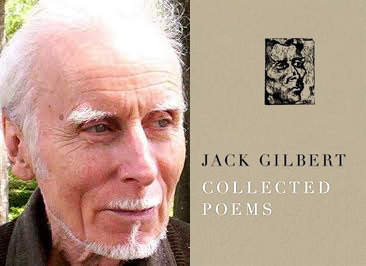
This is not the first time I've shared my love of his work on the blog, but I'll say it again: Jack Gilbert is such an important poet to me. I was writing like him before I even know what he was writing like; finding his work made me feel at home, at last. If my eulogy placed my poems in lineage with his, I would die happy. So when the Collected Poems landed on my doorstep I let out a little yelp of joy.
Physically, it is a beautiful book: the digital version above does not capture the natural speckled grain of the tan stock, nor the comparatively luminous white print that disappears from view when you set the book flat on a table--leaving only the poet's name, black & utter in its lettering. The design rivals the hardback edition of Zbigniew Herbert's collected poems that came out a few years back. The interior font is clean, uncluttered (font wonks will note that it is Janson, also used on his book Refusing Heaven). I am grateful to have not only an index of titles but an index of first lines.
Stephen Burt made a comment to me that has always stuck, on the importance of "truth claims" in poetry: not only personal or lyric observations about the world around us, but assertions about the way the world works. Truth claims are something Eastern European poets handle very well and American poets, less so; we cling to indeterminacy and self-doubt. I love self-deprecation in a drinking buddy but in a poet, not so much. One of the things I so admire about Gilbert is his fearlessness about making truth claims even amidst a sea of everyday detail, as in this poem:
A STUBBORN ODE
All of it. The sane woman under the bed with the rat
that is licking off the peanut butter she puts on her
front teeth for him. The beggars of Calcutta blinding
their children while somewhere people are rich
and eating with famous friends and having running water
in their fine houses. Michiko is buried in Kamakura.
The tired farmers thresh barley all day under the feet
of donkeys amid the merciless power of the sun.
The beautiful women grow old, our hearts moderate.
All of us wane, knowing things could have been different.
When Gordon was released from the madhouse, he could
not find Hayden to say goodbye. As he left past
Hall Eight, he saw the face in a basement window,
tears running down the cheeks. And I say, nevertheless.
With the crowd-swell of rich small moments, Gilbert detonates the big lines "The beautiful women grow old, our hearts moderate. / All of us wane, knowing things could have been different."
Perhaps these poems arrive at a perfect time because my third manuscript is so preoccupied with romantic relationships, a theme demonstrably central to Gilbert's work. Much of his work centers on Michiko Nogami, a onetime student, then wife, who passed away at age 36 from cancer after they'd had only 11 years of marriage; other significant female relationships include poet Linda Gregg. "Love is apart from all things," Gilbert wrote in "The Great Fires." "Desire and excitement are nothing beside it....Passion is clearly the path / but does not bring us to love. / It opens the castle of our spirit / so that we might find the love which is / a mystery hidden there."
I fear, in writing about such a fundamental impulse, that I re-use too many images and concerns. But, while we must beware recycling, seeing all these poems in tandem reminds me that repetition is not always a bad idea, because with it comes refinement. No one gets a dance step right the first time. (If you did, it would be boring.)
Gilbert did an incredible in-depth Q&A with The Paris Review, which you can find here. Early on he says this about growing up in Pittsburgh:
"You can’t work in a steel mill and think small. Giant converters hundreds of feet high. Every night, the sky looked enormous. It was a torrent of flames—of fire. The place that Pittsburgh used to be had such scale. My father never brought home three pounds of potatoes. He always came home with crates of things. Everything was grand, heroic. Everything seemed to be gigantic in Pittsburgh—the people, the history. Sinuousness. Power. Substance. Meaningfulness."
...and then later, this:
"Oh, I like ornament at the right time, but I don’t want a poem to be made out of decoration. If you like that kind of poetry, more power to you, but it doesn’t interest me. When I read the poems that matter to me, it stuns me how much the presence of the heart—in all its forms—is endlessly available there. To experience ourselves in an important way just knocks me out. It puzzles me why people have given that up for cleverness. Some of them are ingenious, more ingenious than I am, but so many of them aren’t any good at being alive."
...I'm not going to gild the lily. You figure out for yourself if those words resonate. But for me, they do, and that is what I'm at work on these days.
Published on June 25, 2012 11:05
June 19, 2012
Treasure Hunt

When I decided to be a full-time writer, I jerry-rigged the core of my creative self--poetry--to a new and relatively untested instinct to write nonfiction. On a practical level, I can't make ends meet without both incomes; on an aesthetic level, this next collection will benefit from the breathing room of times I'm focused on prose. Still, it was a risk.
For the past couple of weeks I've felt in over my head.
I was incredibly fortunate to start with the Washington Post Magazine and then Don't Kill the Birthday Girl, but those opportunities do not equate to the decade of trench journalism experience many of my colleagues can build on. A piece I wrote on spec--on an issue I feel strongly about--has been rejected three times over. I spent two days on a 1,600-word essay that feels DOA unless I do a major overhaul for tone. A key freelance gig has been in the limbo of people slow to return messages. Another editor is sitting on a trip of story ideas I sent, because I accidentally mistimed and sent during their production week. I am not quite ready to sell the nonfiction book I need to anchor it all.
It's an incredible gift to reach a set of goals and then claw past them, ever higher. It's also scary as hell. Do not conflate publishing an essay or article with publishing a book. They require very different skill sets. Can I do this? Can I juggle multiple topics and pitches? Can I find that magical balance of being persistent without pestering?
Here's where I'm supposed to tell you how I re-inspired myself through reading, or daily writing prompts, or a conversation with a trusted mentor. None of those things happened. For a few days I simply hid out in a cave, e.g., watching a whole season of Grey's Anatomy.
That didn't fix anything. So I started reclaiming the tenets of being a real girl in a real life, writer or not. I went to the dentist. I got a haircut. I donated clothes I'd outgrown, berating myself for all every time I'd ordered french fries while on book tour, and laundered the others. I visited my grandmother. I went to a friend's engagement party and to another friend's baby-birthday party. I stuck it out through the 14th inning of a Nationals game.
 For once my refrigerator holds real food, perishables like sorrel and blueberries. I've gone a whole month without a roadside meal of sardines on Triscuits. I cooked lunch for a boy I love, packed it in the picnic basket my mother gave me for my birthday, and took it to his studio on a rainy Tuesday.
For once my refrigerator holds real food, perishables like sorrel and blueberries. I've gone a whole month without a roadside meal of sardines on Triscuits. I cooked lunch for a boy I love, packed it in the picnic basket my mother gave me for my birthday, and took it to his studio on a rainy Tuesday. These writing frustrations didn't go anywhere in the meantime. They pulsed and glowed in the dark, waiting, a fist of worry. I just looked the other way.
My super-ambitious side wants to think that all it takes is a couple of days to pull out of a bad stretch, but sometimes it takes longer. Finally, this past weekend, the worries unclenched a little. Perhaps it was the moment, at a friend's rooftop party in Adams Morgan, when she said, "I think all freelancers go through this. Some weeks it is great. Some weeks you go to yoga five days in a row and wonder what the hell you're doing with your life."
In that moment, hearing her say that, I forgave myself for being scared. Then I did a jello shot with her friends. I may be an old soul in some ways, but I'm a youngin' in others. And that's okay.
Monday morning brought groceries, and drycleaning. Then good news: a publisher in Beijing purchased the rights to print a paperback edition of DKTBG in Chinese. More good news: that freelance gig materialized, complete with a contract that articulated word counts and fees.
I swung by a local bookstore to pick up LIVING WITHOUT, in which I have a back-page article. As I walked in, I thought, I need to pause and realize how grateful I would have been, at 25, to be able to do this. This is not an errand. This is a treasure hunt.
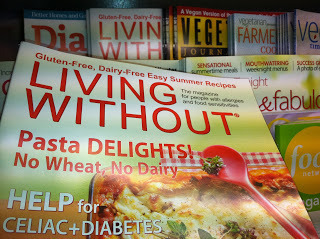
I looked around, and soon I found the issue of TIN HOUSE with my sestinas.
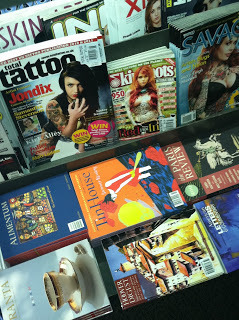
I kept looking, and soon I found my sister. On the cover of a hair magazine.
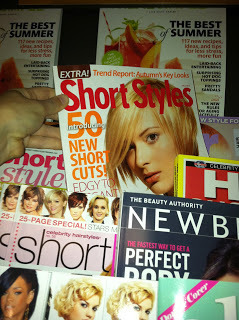
By one in the morning last night I found myself driving a Swiss playwright around town, showing off monuments. We'd watched a staged reading of his play earlier that evening at the Goethe Institut--I'd been delighted to receive an invitation out of the blue. He had seen my poems in WESPENNEST and liked them, realized I lived in DC, and reached out.
His translator picked Clyde's for a bite to eat afterwards, so I bought the playwright his first oyster shooter. Probably his only oyster shooter, but I admired his fearlessness. We walked up to the Jefferson Memorial and he threw his arms out into the air and whooped aloud. We had the place entirely to ourselves, other than the Park Ranger ensconced behind his desk and a heron picking delicately along the Tidal Basin.
Who knows? Perhaps the next time I see him it'll be in Zurich.
I have two homeless essays and a dozen emails I'm not looking forward to writing. This freelance gig could be a huge deal or a humiliating exercise in kill fees. No lightning bolt has struck on the book front.
A hard few weeks. But I'm here. I'm not giving up. There will be mistakes, missteps. There will be editors who--I pray--take a deep breath and have patience with me. The point is, I refuse to let my desire to do it perfectly prevent me from getting it done at all.
Published on June 19, 2012 12:18
June 4, 2012
View from My Desk
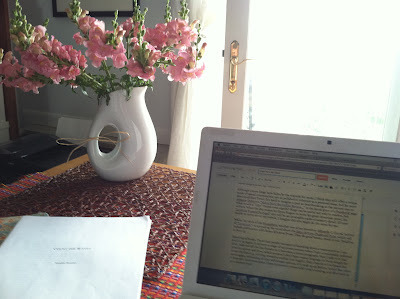
As bloggers go, I'm a regular reader guilty of lurking--in part because so many times I've sunk 10 minutes into composing a comment, only to have the text disappear into the ether because of an errant key click. But I want to mention that C. Dale Young is retiring "Avoiding the Muse," and this makes me both sad (on a selfish level) and happy that he can devote that much more time to new projects. C. Dale, you were one of the most consistent and articulate voices when all these blogs started up; thank you.
Although blogs have fallen by the wayside for many, they offer a unique mode of casual conversation; not as coherent as a personal essay, but far more developed than Tweet. It's hard to imagine a post as heartbreaking as the current one on Jehanne Dubrow's "Notes from the Gefilte Review..." in the harsh glare of a Facebook page. What would a "Like" thumb even signify? Much like a diary, blogs are useful not only to readers but their writers. When the day comes for Steve Rogers to write his great American novel, his "Looking Toward Portugal" site will be an invaluable cache of sensory detail. CDP might do the same for me should I write a travel memoir.
In the blogsphere, another favorite--Eduardo C. Corral of "Lorcaloca"--is spreading the word about the Rane Arroyo Chapbook Prize, which includes publication with Seven Kitchens Press. They do good books; check it out. Deadline is June 15.
Speaking of books, I'm at that painful stage of knocking down a manuscript so I can build it up again. This mirrors a stage of my poem process: I take a reasonably polished draft and remove all the line breaks so it becomes a prose paragraph. Next I edit it in that form for syntax and flow, which ensures I don't have excess language in there simply for visual rhythm (e.g., writing toward a median line length). Only then do a I re-break the poem again, rethinking all line and stanza options. If it ends up as before, lovely. But often it does not. And sometimes I have to come to terms with what's missing, and dive back in to revise on a content level.
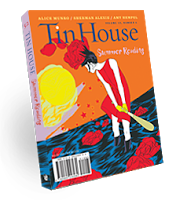 I can easily claim Count the Waves is being close to finished. Each of the sestinas will galley up to two pages, so I've got the literal cumulative length; I have a well of poems to draw from that have good pub credits attached. Two of those poems can be found in the new summer Tin House, which is gorgeous; I'm beyond honored to be in the same TOC as Sherman Alexie and Adrienne Rich.
I can easily claim Count the Waves is being close to finished. Each of the sestinas will galley up to two pages, so I've got the literal cumulative length; I have a well of poems to draw from that have good pub credits attached. Two of those poems can be found in the new summer Tin House, which is gorgeous; I'm beyond honored to be in the same TOC as Sherman Alexie and Adrienne Rich. But you can't declare a book done just because you've met page count. In re-reading over the past few weeks, I've realized that certain poems that stand perfectly well alone become redundant piled up one on top of the other. All poets, especially in mid-stage careers, have to police themselves so that they don't get lazy--relying on images, dramatic tensions, and rhetorical devices that they return to so often as to border on self-parody. (Mike Young and Elisa Gabbert stirred this hornet's nest when they published "Moves in Contemporary Poetry" back in 2010 over at HTMLGIANT). What intrigues me about this manuscript is that it is centered on love. What I have to resist about this manuscript is that it is centered on love.
So I'm taking out poems. A lot of poems. Some because they're filler, some because they're echoes of stronger poems, some because they belong in (gulp) the next collection, whatever that is. It's really really really hard to sit down for an afternoon of manuscripting, feel like you got something accomplished, and yet leave the desk with a shorter book than before. That said, when things truly click into place, you know. Plus it's a source of generative motivation: nature abhors a vacuum. Holes in my third section, look out. I'm coming for ya.
Published on June 04, 2012 11:10
May 24, 2012
Spacers
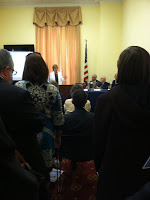 On May 10, I trekked downtown to the Rayburn Building to witness Allergy & Asthma Day Capitol Hill 2012, sponsored by AANMA (Allergy and Asthma Network Mothers of Asthmatics). It was inspiring to see a room crowded to overflowing with doctors, concerned parents, and congressional staff, all talking through the FDA's proposed changes to how allergy medications are prescribed. To summarize the dilemma at hand: kiosk consultations and over-the-counter distribution of such medications as EpiPens would ease access for some, but could undermine the critical infrastructure of diagnosis and advice tailored to the patient.
On May 10, I trekked downtown to the Rayburn Building to witness Allergy & Asthma Day Capitol Hill 2012, sponsored by AANMA (Allergy and Asthma Network Mothers of Asthmatics). It was inspiring to see a room crowded to overflowing with doctors, concerned parents, and congressional staff, all talking through the FDA's proposed changes to how allergy medications are prescribed. To summarize the dilemma at hand: kiosk consultations and over-the-counter distribution of such medications as EpiPens would ease access for some, but could undermine the critical infrastructure of diagnosis and advice tailored to the patient.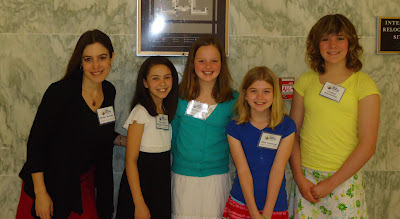
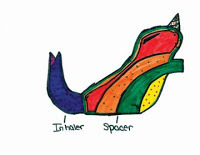 I met Charles G. Thiel, who invented the metered dose inhaler in 1956, and the four amazing girls in the photo above. They were the under-18 finalists for this year's "Ultimate Inhaler Contest," in which the AANMA invited inhaler designs that were more attractive, efficient, and fun. My favorite was the "Unisaur," an "Inhaler/Holding Chamber Combo" designed by twelve-year-old Rachael Blaine, of Manchester, PA. (She says unisaur; I say narwhal.) Holding chambers, also caused spacers, were introduced to inhaler usage in the early '90s. Until then kids like me tended to jam the inhaler tightly in our mouths, depressing the spray in a way that coated the back of the throat rather than dispersing and reaching the airway it was designed to help. What can I say? That silver taste was comforting, especially when in the grip of an asthma attack. With a spacer, the metered dose has a chance to aerate post-expulsion and be breathed in, rather than pseudo-swallowed.
I met Charles G. Thiel, who invented the metered dose inhaler in 1956, and the four amazing girls in the photo above. They were the under-18 finalists for this year's "Ultimate Inhaler Contest," in which the AANMA invited inhaler designs that were more attractive, efficient, and fun. My favorite was the "Unisaur," an "Inhaler/Holding Chamber Combo" designed by twelve-year-old Rachael Blaine, of Manchester, PA. (She says unisaur; I say narwhal.) Holding chambers, also caused spacers, were introduced to inhaler usage in the early '90s. Until then kids like me tended to jam the inhaler tightly in our mouths, depressing the spray in a way that coated the back of the throat rather than dispersing and reaching the airway it was designed to help. What can I say? That silver taste was comforting, especially when in the grip of an asthma attack. With a spacer, the metered dose has a chance to aerate post-expulsion and be breathed in, rather than pseudo-swallowed. 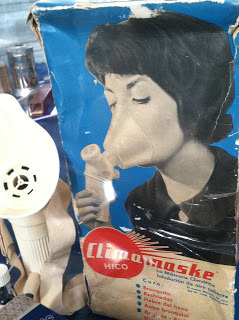 This year's theme was celebrating "Innovations in Technology," so AANMA had set up a table display of outdated medical treatments for asthma and allergies. Dr. R. Schiffman's Asthmador Cigarettes, "to relieve the distress of bronchial asthmatic paroxysms." (Active ingredients: Stramonium and Belladonna.) Clima-maske, anyone? It all seems so surreal and awkward as to be a joke.
This year's theme was celebrating "Innovations in Technology," so AANMA had set up a table display of outdated medical treatments for asthma and allergies. Dr. R. Schiffman's Asthmador Cigarettes, "to relieve the distress of bronchial asthmatic paroxysms." (Active ingredients: Stramonium and Belladonna.) Clima-maske, anyone? It all seems so surreal and awkward as to be a joke. But then, under glass, I saw it: first spacer I'd ever been given. A baby blue, collapsible canister that predates today's rigid aerochambers. I'd hated that thing. O how it wheezed like an accordion. O how spit crusted around its poorly-designed mouthpiece.
If you'd have told me in MFA days that my career as an author would bring me down to Capitol Hill on a Wednesday morning, or have me posing for photos with kids, I'd have thought you were crazy. I never expected this part of my identity--the perils and hoop-jumping of asthma and allergy--to be on the pages of a book. For that matter, I never expected to be memoirist; I thought I'd always have that veil of poetry, no matter how flimsy and artificial, protecting me from intrusive interpretations of my work.
Now my creative life and my personal life are one. On a bad day, that leaves me feeling exposed, or in over my head--asked to counsel beyond my qualifications. On a good day I make incredible, insightful connections with people who are so excited to see sympathetic experiences on the page. And I find myself wondering where to go from here. These conversations, these meetings, these days of advocacy: they change lives. Including mine. But I have to let it all aerate before I breathe it in, and before I decide what the next book will be. This summer is my spacer.
Published on May 24, 2012 08:50
May 8, 2012
Extremes
Eleven days. Remember that. All in eleven days.
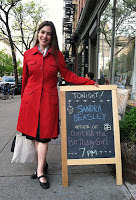 It began with a drive from DC to Brooklyn, a reunion with my TRIP CITY crew in the Hang Dai office next door to BookCourt, where I'd be reading that evening to launch the paperback of Don't Kill the Birthday Girl. Realization that the launch needed drinks-->frantic runaround to secure wine and cups-->Thai dinner with four writer friends (DC & NYC worlds collide)-->my reading-->a perfectly balanced scotch cocktail with another writer friend (from VCCA days)-->Rev Jen's Anti-Poetry Slam at the Bowery, where I saw not one but two naked men in the name of art. Unattractively naked men. Drove to my uncle's place up on West 85th, my first time ever driving in Manhattan, and pondered getting two suitcases up to a five-story walk-up. Chose to nap for an hour in the car instead. Woke up, got inside, set the alarm to move the car to a legal parking place at 7 AM.
It began with a drive from DC to Brooklyn, a reunion with my TRIP CITY crew in the Hang Dai office next door to BookCourt, where I'd be reading that evening to launch the paperback of Don't Kill the Birthday Girl. Realization that the launch needed drinks-->frantic runaround to secure wine and cups-->Thai dinner with four writer friends (DC & NYC worlds collide)-->my reading-->a perfectly balanced scotch cocktail with another writer friend (from VCCA days)-->Rev Jen's Anti-Poetry Slam at the Bowery, where I saw not one but two naked men in the name of art. Unattractively naked men. Drove to my uncle's place up on West 85th, my first time ever driving in Manhattan, and pondered getting two suitcases up to a five-story walk-up. Chose to nap for an hour in the car instead. Woke up, got inside, set the alarm to move the car to a legal parking place at 7 AM.
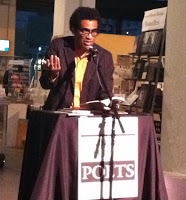 Another day, another reading in Brooklyn: a launch for the gorgeous redesign of AMERICAN POET. But first a meeting at the New York Times offices (outside, playing it cool // inside, what?!? this building is so fancy! will I get to write for them? maybe?? pleasepleaseplease), sushi lunch with another food allergy memoirist, interview for Beatrice.com at Random House, bloody mary with a fellow freelancer at Bubby's. First time in DUMBO. I stuffed the month's bills & checks into a postal box; some of them would disappear forever. Yusef Komunyakaa stood us up, so Thomas Sayers Ellis (bless his crazy brilliant heart) did his best Yusef impression. Late-night with the TC crew, where we literally pooled nickels and dimes to cover the six-person bill. Got dropped off at a subway stop that turned out to be closed; lost and intimidated by the men hanging out in the park, called my friend to come back, pick me up, drive me...around the corner. Where there turned out to be a perfectly functional subway stop, albeit one where I walked nine blocks on the Manhattan end. Watered my uncle's plants, his one request. Set my alarm for 5 AM to drive to BWI.
Another day, another reading in Brooklyn: a launch for the gorgeous redesign of AMERICAN POET. But first a meeting at the New York Times offices (outside, playing it cool // inside, what?!? this building is so fancy! will I get to write for them? maybe?? pleasepleaseplease), sushi lunch with another food allergy memoirist, interview for Beatrice.com at Random House, bloody mary with a fellow freelancer at Bubby's. First time in DUMBO. I stuffed the month's bills & checks into a postal box; some of them would disappear forever. Yusef Komunyakaa stood us up, so Thomas Sayers Ellis (bless his crazy brilliant heart) did his best Yusef impression. Late-night with the TC crew, where we literally pooled nickels and dimes to cover the six-person bill. Got dropped off at a subway stop that turned out to be closed; lost and intimidated by the men hanging out in the park, called my friend to come back, pick me up, drive me...around the corner. Where there turned out to be a perfectly functional subway stop, albeit one where I walked nine blocks on the Manhattan end. Watered my uncle's plants, his one request. Set my alarm for 5 AM to drive to BWI.
Got to Baltimore and flew to Atlanta. Rented a car and drove to Birmingham, to crash on the couch of a friend from Oxford days. Laughed a lot. Gossiped a little. Slept hard.
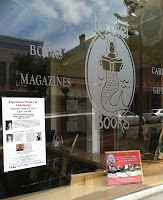 Drove to Mississippi to "Experience Poetry in Vicksburg" on a Saturday afternoon. If being practical, this would have been the reading to cancel once committed to being in NYC two days earlier. But you just don't do that.And there turned out to be a library auditorium full of good people, a great conversation, an honorarium I didn't know about, every copy in my stock of all three titles sold by Lorelei Books, and garlic-stuffed olives I scarfed down by the handful at a fun reception (I know, I know--never kiss me). I went from crashing on a 20-something's couch to sleeping in a 20-foot ceilinged room in a B&B built in 1860.
Drove to Mississippi to "Experience Poetry in Vicksburg" on a Saturday afternoon. If being practical, this would have been the reading to cancel once committed to being in NYC two days earlier. But you just don't do that.And there turned out to be a library auditorium full of good people, a great conversation, an honorarium I didn't know about, every copy in my stock of all three titles sold by Lorelei Books, and garlic-stuffed olives I scarfed down by the handful at a fun reception (I know, I know--never kiss me). I went from crashing on a 20-something's couch to sleeping in a 20-foot ceilinged room in a B&B built in 1860.
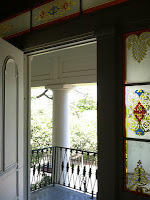 Next day: realizing my B&B had no pantry I headed to Anchuca, built in 1830, where I sipped sweet tea & gave the Southern chef a panic attack with my allergies. ("So...is this lactose intolerance?" "No. This is severe, deadly, no cheese no butter no nothing." "Oh. Just checking.") BBQ breakfast? Whatever works. I stood on a balcony once occupied by Jefferson Davis. Toured National Military Park, realizing my comment from the reading the day before while reading "Antietam"--about the anticlimactic nature of field trips to Civil War battlefields--applies to every town BUT this one. I looked down cannon barrels. I peered up at domes. I stood in the body of the U.S.S. Cairo. Vicksburg ain't kidding around.
Next day: realizing my B&B had no pantry I headed to Anchuca, built in 1830, where I sipped sweet tea & gave the Southern chef a panic attack with my allergies. ("So...is this lactose intolerance?" "No. This is severe, deadly, no cheese no butter no nothing." "Oh. Just checking.") BBQ breakfast? Whatever works. I stood on a balcony once occupied by Jefferson Davis. Toured National Military Park, realizing my comment from the reading the day before while reading "Antietam"--about the anticlimactic nature of field trips to Civil War battlefields--applies to every town BUT this one. I looked down cannon barrels. I peered up at domes. I stood in the body of the U.S.S. Cairo. Vicksburg ain't kidding around.
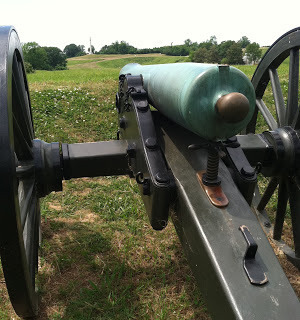


Stopped off in Jackson for campari (with grown-ups) and playing kitties (with a little'un). Note to self: when breaking up a drive, don't clear a mere hour on the first end, leaving six hours on the other end. Ate an entire bag of apple chips while trying to stay awake. That's the equivalent of five apples. Napped in a McDonald's parking lot off I-40 E. Rolled into Atlanta's Highland Inn at 2 AM.
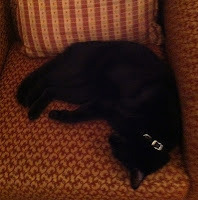 Hid out at the Highland Inn. Had a very affirming phone call regarding the New York Times. Had a very alarming phone call regarding the New York Times. Couldn't absorb having something fall through before I'd even laid in my own bed to daydream about it. Bought myself a ring. Bought a Father's Day gift. Went to dinner at Doc Chey's with a poet friend. Restless, wandered out to hear stand-up in Little Five Points. Was asked by a man on the street: "Do you think you know poetry? Because I can show you poetry."
Hid out at the Highland Inn. Had a very affirming phone call regarding the New York Times. Had a very alarming phone call regarding the New York Times. Couldn't absorb having something fall through before I'd even laid in my own bed to daydream about it. Bought myself a ring. Bought a Father's Day gift. Went to dinner at Doc Chey's with a poet friend. Restless, wandered out to hear stand-up in Little Five Points. Was asked by a man on the street: "Do you think you know poetry? Because I can show you poetry."
 The next morning I migrated from the boho charms of the Highland Inn (burned out light bulbs) (scavenging Folger's coffee and an unripe banana every morning) to the luminous beauty of SCAD's Ivy Hall (chandelier) (fridge stocked with juice and San Pellegrino). Turned on computer; demoralized by number of unread emails; turned off computer. Led a workshop on "Projecting Your Voice on the Page." Tried to look pretty for the photographer despite having only had two baths in a week. Reading. Dinner ambush: a salad in which the squash I'd okayed did its finest cucumber impression. Beers at Manuel's Tavern with three poets. Arguing over the Decatur Book Festival, bluffing about the future of bookselling, commiserating over the job market.
The next morning I migrated from the boho charms of the Highland Inn (burned out light bulbs) (scavenging Folger's coffee and an unripe banana every morning) to the luminous beauty of SCAD's Ivy Hall (chandelier) (fridge stocked with juice and San Pellegrino). Turned on computer; demoralized by number of unread emails; turned off computer. Led a workshop on "Projecting Your Voice on the Page." Tried to look pretty for the photographer despite having only had two baths in a week. Reading. Dinner ambush: a salad in which the squash I'd okayed did its finest cucumber impression. Beers at Manuel's Tavern with three poets. Arguing over the Decatur Book Festival, bluffing about the future of bookselling, commiserating over the job market.
Got up, flew home to BWI, discovered my car battery had gone dead in the airport parking lot. Got a jump. Needed to drive home, fast, and work. Drove home, ate an entire bag of roasted peanuts, and watched three episodes of Gossip Girl.
Thursday. Had to be in Vienna, Virginia, by 10 AM to lead a discussion for the "Writing Your Personal History" symposium. Made it by 10:03. Was so busy signing books at the lunch break that I ate my embarrassingly fragrant basil-chicken with a plastic fork while hunkered down against a wall during the next presenter's talk. Dashed to my folks' house nearby so I could take a 3 PM conference call for being a judge at this year's Poetry Out Loud semifinals. Alice Quinn recited her office number over the line and I resisted the urge to jot it down. Another phone call that resurrected my hope in the New York Times gig. Sat on the deck with my mom and tried, helplessly and haphazardly, to catch up. Drove on to DC just in time to catch Philip Levine give his closing address as Poet Laureate at the Library of Congress. Waved to Ron Charles of the Washington Post. He didn't recognize me until I teased him about it over Twitter the next day.
On Friday, May 4, it turns out I won the Larry Neal Writers' Award from the DC Commission on the Arts and Humanities. I wasn't there to accept, to my eternal regret. Where I was--and where I know I needed to be--was in Great Falls, at my mother's first open studio for a solo art show in over two decades.
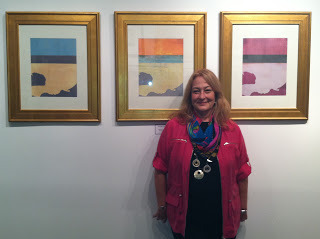
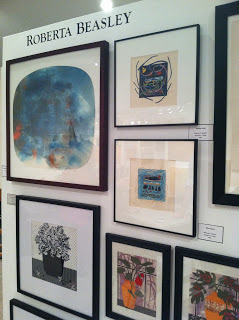
That's my mom. She is amazing.
So I didn't even know I'd won. I didn't know until I got an email from one of the other finalists that arrived Saturday night. May 5. My birthday--and the unholy extravaganza known as Cinco de Sandra. I had woken to an entire day spent shopping for beer, bottles of water, chips, pretzel goldfish, gummi worms, tablecloths, flowers...and a fancy dress because damn it, I haven't bought a single item of clothing in over a year. I got out the construction paper and the rubber cement, made five small signs and one big one. At 7 PM we got access to a space that had to be ready by 8 PM. A man came up and said "I love your work," and I asked him if he could help assemble a table. A man walked up and said "Happy Birthday," handed me a mini bottle of Knob Creek, and walked away without ever telling me his name.
We came. We hustled. We jimmied tech hook-ups and poured chips and crammed flowers into water. We mingled (well, everyone else did; I dervished). There was an amazing DJ. We read. We projected comix. We laughed. My sister bartended with style. Eric ran a half-mile to get five extra bags of ice. I saw students, old friends, writers, strangers. I said to my sister "I'm going to read a dirty poem, don't listen." And by midnight we had to be packed up and cleared out.
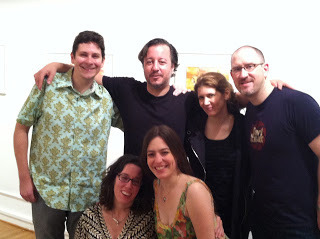
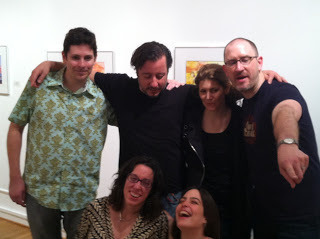
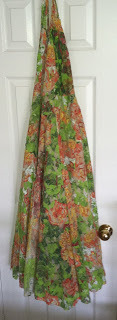 This life moves so fast. I say that with neither pride nor self-pity; I know better than to think it will always be this way. I say that with wonderment. Some days, I worry that a life moving so fast won't allow anyone to get close enough to love me. Then comes a day when I stand in a room with 70 people singing "Happy Birthday," and my heart is filled to bursting.
This life moves so fast. I say that with neither pride nor self-pity; I know better than to think it will always be this way. I say that with wonderment. Some days, I worry that a life moving so fast won't allow anyone to get close enough to love me. Then comes a day when I stand in a room with 70 people singing "Happy Birthday," and my heart is filled to bursting.
BrooklynManhattanBirminghamVicksburgJacksonAtlantaWashington, DC
Eleven days. Six readings. That's what I've been up to lately.
 It began with a drive from DC to Brooklyn, a reunion with my TRIP CITY crew in the Hang Dai office next door to BookCourt, where I'd be reading that evening to launch the paperback of Don't Kill the Birthday Girl. Realization that the launch needed drinks-->frantic runaround to secure wine and cups-->Thai dinner with four writer friends (DC & NYC worlds collide)-->my reading-->a perfectly balanced scotch cocktail with another writer friend (from VCCA days)-->Rev Jen's Anti-Poetry Slam at the Bowery, where I saw not one but two naked men in the name of art. Unattractively naked men. Drove to my uncle's place up on West 85th, my first time ever driving in Manhattan, and pondered getting two suitcases up to a five-story walk-up. Chose to nap for an hour in the car instead. Woke up, got inside, set the alarm to move the car to a legal parking place at 7 AM.
It began with a drive from DC to Brooklyn, a reunion with my TRIP CITY crew in the Hang Dai office next door to BookCourt, where I'd be reading that evening to launch the paperback of Don't Kill the Birthday Girl. Realization that the launch needed drinks-->frantic runaround to secure wine and cups-->Thai dinner with four writer friends (DC & NYC worlds collide)-->my reading-->a perfectly balanced scotch cocktail with another writer friend (from VCCA days)-->Rev Jen's Anti-Poetry Slam at the Bowery, where I saw not one but two naked men in the name of art. Unattractively naked men. Drove to my uncle's place up on West 85th, my first time ever driving in Manhattan, and pondered getting two suitcases up to a five-story walk-up. Chose to nap for an hour in the car instead. Woke up, got inside, set the alarm to move the car to a legal parking place at 7 AM. Another day, another reading in Brooklyn: a launch for the gorgeous redesign of AMERICAN POET. But first a meeting at the New York Times offices (outside, playing it cool // inside, what?!? this building is so fancy! will I get to write for them? maybe?? pleasepleaseplease), sushi lunch with another food allergy memoirist, interview for Beatrice.com at Random House, bloody mary with a fellow freelancer at Bubby's. First time in DUMBO. I stuffed the month's bills & checks into a postal box; some of them would disappear forever. Yusef Komunyakaa stood us up, so Thomas Sayers Ellis (bless his crazy brilliant heart) did his best Yusef impression. Late-night with the TC crew, where we literally pooled nickels and dimes to cover the six-person bill. Got dropped off at a subway stop that turned out to be closed; lost and intimidated by the men hanging out in the park, called my friend to come back, pick me up, drive me...around the corner. Where there turned out to be a perfectly functional subway stop, albeit one where I walked nine blocks on the Manhattan end. Watered my uncle's plants, his one request. Set my alarm for 5 AM to drive to BWI.
Another day, another reading in Brooklyn: a launch for the gorgeous redesign of AMERICAN POET. But first a meeting at the New York Times offices (outside, playing it cool // inside, what?!? this building is so fancy! will I get to write for them? maybe?? pleasepleaseplease), sushi lunch with another food allergy memoirist, interview for Beatrice.com at Random House, bloody mary with a fellow freelancer at Bubby's. First time in DUMBO. I stuffed the month's bills & checks into a postal box; some of them would disappear forever. Yusef Komunyakaa stood us up, so Thomas Sayers Ellis (bless his crazy brilliant heart) did his best Yusef impression. Late-night with the TC crew, where we literally pooled nickels and dimes to cover the six-person bill. Got dropped off at a subway stop that turned out to be closed; lost and intimidated by the men hanging out in the park, called my friend to come back, pick me up, drive me...around the corner. Where there turned out to be a perfectly functional subway stop, albeit one where I walked nine blocks on the Manhattan end. Watered my uncle's plants, his one request. Set my alarm for 5 AM to drive to BWI.Got to Baltimore and flew to Atlanta. Rented a car and drove to Birmingham, to crash on the couch of a friend from Oxford days. Laughed a lot. Gossiped a little. Slept hard.
 Drove to Mississippi to "Experience Poetry in Vicksburg" on a Saturday afternoon. If being practical, this would have been the reading to cancel once committed to being in NYC two days earlier. But you just don't do that.And there turned out to be a library auditorium full of good people, a great conversation, an honorarium I didn't know about, every copy in my stock of all three titles sold by Lorelei Books, and garlic-stuffed olives I scarfed down by the handful at a fun reception (I know, I know--never kiss me). I went from crashing on a 20-something's couch to sleeping in a 20-foot ceilinged room in a B&B built in 1860.
Drove to Mississippi to "Experience Poetry in Vicksburg" on a Saturday afternoon. If being practical, this would have been the reading to cancel once committed to being in NYC two days earlier. But you just don't do that.And there turned out to be a library auditorium full of good people, a great conversation, an honorarium I didn't know about, every copy in my stock of all three titles sold by Lorelei Books, and garlic-stuffed olives I scarfed down by the handful at a fun reception (I know, I know--never kiss me). I went from crashing on a 20-something's couch to sleeping in a 20-foot ceilinged room in a B&B built in 1860.  Next day: realizing my B&B had no pantry I headed to Anchuca, built in 1830, where I sipped sweet tea & gave the Southern chef a panic attack with my allergies. ("So...is this lactose intolerance?" "No. This is severe, deadly, no cheese no butter no nothing." "Oh. Just checking.") BBQ breakfast? Whatever works. I stood on a balcony once occupied by Jefferson Davis. Toured National Military Park, realizing my comment from the reading the day before while reading "Antietam"--about the anticlimactic nature of field trips to Civil War battlefields--applies to every town BUT this one. I looked down cannon barrels. I peered up at domes. I stood in the body of the U.S.S. Cairo. Vicksburg ain't kidding around.
Next day: realizing my B&B had no pantry I headed to Anchuca, built in 1830, where I sipped sweet tea & gave the Southern chef a panic attack with my allergies. ("So...is this lactose intolerance?" "No. This is severe, deadly, no cheese no butter no nothing." "Oh. Just checking.") BBQ breakfast? Whatever works. I stood on a balcony once occupied by Jefferson Davis. Toured National Military Park, realizing my comment from the reading the day before while reading "Antietam"--about the anticlimactic nature of field trips to Civil War battlefields--applies to every town BUT this one. I looked down cannon barrels. I peered up at domes. I stood in the body of the U.S.S. Cairo. Vicksburg ain't kidding around. 


Stopped off in Jackson for campari (with grown-ups) and playing kitties (with a little'un). Note to self: when breaking up a drive, don't clear a mere hour on the first end, leaving six hours on the other end. Ate an entire bag of apple chips while trying to stay awake. That's the equivalent of five apples. Napped in a McDonald's parking lot off I-40 E. Rolled into Atlanta's Highland Inn at 2 AM.
 Hid out at the Highland Inn. Had a very affirming phone call regarding the New York Times. Had a very alarming phone call regarding the New York Times. Couldn't absorb having something fall through before I'd even laid in my own bed to daydream about it. Bought myself a ring. Bought a Father's Day gift. Went to dinner at Doc Chey's with a poet friend. Restless, wandered out to hear stand-up in Little Five Points. Was asked by a man on the street: "Do you think you know poetry? Because I can show you poetry."
Hid out at the Highland Inn. Had a very affirming phone call regarding the New York Times. Had a very alarming phone call regarding the New York Times. Couldn't absorb having something fall through before I'd even laid in my own bed to daydream about it. Bought myself a ring. Bought a Father's Day gift. Went to dinner at Doc Chey's with a poet friend. Restless, wandered out to hear stand-up in Little Five Points. Was asked by a man on the street: "Do you think you know poetry? Because I can show you poetry."  The next morning I migrated from the boho charms of the Highland Inn (burned out light bulbs) (scavenging Folger's coffee and an unripe banana every morning) to the luminous beauty of SCAD's Ivy Hall (chandelier) (fridge stocked with juice and San Pellegrino). Turned on computer; demoralized by number of unread emails; turned off computer. Led a workshop on "Projecting Your Voice on the Page." Tried to look pretty for the photographer despite having only had two baths in a week. Reading. Dinner ambush: a salad in which the squash I'd okayed did its finest cucumber impression. Beers at Manuel's Tavern with three poets. Arguing over the Decatur Book Festival, bluffing about the future of bookselling, commiserating over the job market.
The next morning I migrated from the boho charms of the Highland Inn (burned out light bulbs) (scavenging Folger's coffee and an unripe banana every morning) to the luminous beauty of SCAD's Ivy Hall (chandelier) (fridge stocked with juice and San Pellegrino). Turned on computer; demoralized by number of unread emails; turned off computer. Led a workshop on "Projecting Your Voice on the Page." Tried to look pretty for the photographer despite having only had two baths in a week. Reading. Dinner ambush: a salad in which the squash I'd okayed did its finest cucumber impression. Beers at Manuel's Tavern with three poets. Arguing over the Decatur Book Festival, bluffing about the future of bookselling, commiserating over the job market.Got up, flew home to BWI, discovered my car battery had gone dead in the airport parking lot. Got a jump. Needed to drive home, fast, and work. Drove home, ate an entire bag of roasted peanuts, and watched three episodes of Gossip Girl.
Thursday. Had to be in Vienna, Virginia, by 10 AM to lead a discussion for the "Writing Your Personal History" symposium. Made it by 10:03. Was so busy signing books at the lunch break that I ate my embarrassingly fragrant basil-chicken with a plastic fork while hunkered down against a wall during the next presenter's talk. Dashed to my folks' house nearby so I could take a 3 PM conference call for being a judge at this year's Poetry Out Loud semifinals. Alice Quinn recited her office number over the line and I resisted the urge to jot it down. Another phone call that resurrected my hope in the New York Times gig. Sat on the deck with my mom and tried, helplessly and haphazardly, to catch up. Drove on to DC just in time to catch Philip Levine give his closing address as Poet Laureate at the Library of Congress. Waved to Ron Charles of the Washington Post. He didn't recognize me until I teased him about it over Twitter the next day.
On Friday, May 4, it turns out I won the Larry Neal Writers' Award from the DC Commission on the Arts and Humanities. I wasn't there to accept, to my eternal regret. Where I was--and where I know I needed to be--was in Great Falls, at my mother's first open studio for a solo art show in over two decades.


That's my mom. She is amazing.
So I didn't even know I'd won. I didn't know until I got an email from one of the other finalists that arrived Saturday night. May 5. My birthday--and the unholy extravaganza known as Cinco de Sandra. I had woken to an entire day spent shopping for beer, bottles of water, chips, pretzel goldfish, gummi worms, tablecloths, flowers...and a fancy dress because damn it, I haven't bought a single item of clothing in over a year. I got out the construction paper and the rubber cement, made five small signs and one big one. At 7 PM we got access to a space that had to be ready by 8 PM. A man came up and said "I love your work," and I asked him if he could help assemble a table. A man walked up and said "Happy Birthday," handed me a mini bottle of Knob Creek, and walked away without ever telling me his name.
We came. We hustled. We jimmied tech hook-ups and poured chips and crammed flowers into water. We mingled (well, everyone else did; I dervished). There was an amazing DJ. We read. We projected comix. We laughed. My sister bartended with style. Eric ran a half-mile to get five extra bags of ice. I saw students, old friends, writers, strangers. I said to my sister "I'm going to read a dirty poem, don't listen." And by midnight we had to be packed up and cleared out.


 This life moves so fast. I say that with neither pride nor self-pity; I know better than to think it will always be this way. I say that with wonderment. Some days, I worry that a life moving so fast won't allow anyone to get close enough to love me. Then comes a day when I stand in a room with 70 people singing "Happy Birthday," and my heart is filled to bursting.
This life moves so fast. I say that with neither pride nor self-pity; I know better than to think it will always be this way. I say that with wonderment. Some days, I worry that a life moving so fast won't allow anyone to get close enough to love me. Then comes a day when I stand in a room with 70 people singing "Happy Birthday," and my heart is filled to bursting. BrooklynManhattanBirminghamVicksburgJacksonAtlantaWashington, DC
Eleven days. Six readings. That's what I've been up to lately.
Published on May 08, 2012 11:45
April 24, 2012
Write What You Know...Kinda
This past weekend I took part in both the Bethesda Literary Festival and the Annapolis Book Festival. At the latter I got to take part in two panels. One was on "The Politics of Food" (super-interesting, and nice to draw on the science/policy research I did for DKTBG) and one that asked "Can Creative Writing Be Taught?"
This is invariably a rhetorical question when five writers who teach weigh in (the event was hosted by the Writer's Center). There was still enjoyable variety in what we had to say. I particularly loved hearing from Ron Capps, who works with veterans who are often coming to the table without even -wanting- to write. But at one point the old saw of "Write what you know" came up, and because of time constraints I didn't speak up to complicate that advice. I regret not doing that, so I'll do it here.
Write what you know, yes.But know things beyond your own navel.
Too often we use "write what you know" to justify solipsism, an indulgence of the "I,"a family story or personal narrative offered without context in the larger world.
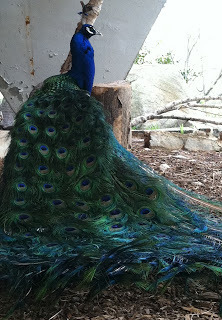 When I sit down to write, it is often in the key of loneliness. So I could write about what's right in front of my face: a failing relationship, a 14-hour drive, a warm scotch on a cold night. All things I know. But I am also lucky enough to live near the National Zoo, where I take weekly walks to clear my head as I ruminate on these things. There I visit with platypi, capybaras, peacocks--creatures whose habits and personalities I perceive in a visceral way that is then expanded by a few hours of research into their genetic lineage, their anatomy, their role in human history. In sitting down to write a somewhat confessional poem, yes, I'm writing what I know. But in sitting down to write an ode to peacocks--which you will find in your May issue of Poetry, such a huge thrill--I am also writing "what I know."
When I sit down to write, it is often in the key of loneliness. So I could write about what's right in front of my face: a failing relationship, a 14-hour drive, a warm scotch on a cold night. All things I know. But I am also lucky enough to live near the National Zoo, where I take weekly walks to clear my head as I ruminate on these things. There I visit with platypi, capybaras, peacocks--creatures whose habits and personalities I perceive in a visceral way that is then expanded by a few hours of research into their genetic lineage, their anatomy, their role in human history. In sitting down to write a somewhat confessional poem, yes, I'm writing what I know. But in sitting down to write an ode to peacocks--which you will find in your May issue of Poetry, such a huge thrill--I am also writing "what I know."
My point is, what you know extends far beyond internal monologue. Write about the history of a Shenandoah National Park trail, not just a fight you had with your boyfriend as you hiked it. Write about how to make a perfect pie crust, or how to dock a sailboat with one knot. Write about fights your parents had over money when you were a kid, but look up what the actual state of the economy was at the time--how much did a loaf of bread cost? a house? what was the living wage?--and include that too.
I'm not preaching from on high; I struggle with this. As a memoirist, part of me wanted to curl up in the safe zone of my own story, which couldn't be easily contradicted. But I knew my book had to look to the larger realms of science, cultural analysis, and public policy, even at the risk of getting something wrong or entering an argument. I wrote a chapter on peanut allergies although I'm not allergic to peanuts. I interviewed allergic women my age who decided to become mothers because, though I have not, that is an important part of the story. And I think (I hope) it's a better book for all that.
Tomorrow I head up to New York for back-to-back readings in Brooklyn: the paperback launch for Don't Kill the Birthday Girl at BookCourt on Wednesday, April 25, and a reading with Yusef Komunyakaa and Thomas Sayers Ellis to celebrate the redesign of American Poet at the DUMBO powerHouse Arena on Thursday, April 26. Then I dash to make an afternoon flight on Friday out of BWI; from there on to the "Experience Poetry in Vicksburg" festival--a return to my beloved Mississippi!--on April 28 and a reading at SCAD's Atlanta campus on Tuesday, May 1. Home just in time for a Vienna memoir conference on May 3. I might just barely break even on all this. Oh: and then we throw a reading/extravaganza/birthday thingie on May 5. You should come.
In another news, my sister is awesome. She is truly a friend to the sea turtle, both the fleshy and beanbag variety. And she'll be bartending at Cinco de Sandra.
This is invariably a rhetorical question when five writers who teach weigh in (the event was hosted by the Writer's Center). There was still enjoyable variety in what we had to say. I particularly loved hearing from Ron Capps, who works with veterans who are often coming to the table without even -wanting- to write. But at one point the old saw of "Write what you know" came up, and because of time constraints I didn't speak up to complicate that advice. I regret not doing that, so I'll do it here.
Write what you know, yes.But know things beyond your own navel.
Too often we use "write what you know" to justify solipsism, an indulgence of the "I,"a family story or personal narrative offered without context in the larger world.
 When I sit down to write, it is often in the key of loneliness. So I could write about what's right in front of my face: a failing relationship, a 14-hour drive, a warm scotch on a cold night. All things I know. But I am also lucky enough to live near the National Zoo, where I take weekly walks to clear my head as I ruminate on these things. There I visit with platypi, capybaras, peacocks--creatures whose habits and personalities I perceive in a visceral way that is then expanded by a few hours of research into their genetic lineage, their anatomy, their role in human history. In sitting down to write a somewhat confessional poem, yes, I'm writing what I know. But in sitting down to write an ode to peacocks--which you will find in your May issue of Poetry, such a huge thrill--I am also writing "what I know."
When I sit down to write, it is often in the key of loneliness. So I could write about what's right in front of my face: a failing relationship, a 14-hour drive, a warm scotch on a cold night. All things I know. But I am also lucky enough to live near the National Zoo, where I take weekly walks to clear my head as I ruminate on these things. There I visit with platypi, capybaras, peacocks--creatures whose habits and personalities I perceive in a visceral way that is then expanded by a few hours of research into their genetic lineage, their anatomy, their role in human history. In sitting down to write a somewhat confessional poem, yes, I'm writing what I know. But in sitting down to write an ode to peacocks--which you will find in your May issue of Poetry, such a huge thrill--I am also writing "what I know." My point is, what you know extends far beyond internal monologue. Write about the history of a Shenandoah National Park trail, not just a fight you had with your boyfriend as you hiked it. Write about how to make a perfect pie crust, or how to dock a sailboat with one knot. Write about fights your parents had over money when you were a kid, but look up what the actual state of the economy was at the time--how much did a loaf of bread cost? a house? what was the living wage?--and include that too.
I'm not preaching from on high; I struggle with this. As a memoirist, part of me wanted to curl up in the safe zone of my own story, which couldn't be easily contradicted. But I knew my book had to look to the larger realms of science, cultural analysis, and public policy, even at the risk of getting something wrong or entering an argument. I wrote a chapter on peanut allergies although I'm not allergic to peanuts. I interviewed allergic women my age who decided to become mothers because, though I have not, that is an important part of the story. And I think (I hope) it's a better book for all that.
Tomorrow I head up to New York for back-to-back readings in Brooklyn: the paperback launch for Don't Kill the Birthday Girl at BookCourt on Wednesday, April 25, and a reading with Yusef Komunyakaa and Thomas Sayers Ellis to celebrate the redesign of American Poet at the DUMBO powerHouse Arena on Thursday, April 26. Then I dash to make an afternoon flight on Friday out of BWI; from there on to the "Experience Poetry in Vicksburg" festival--a return to my beloved Mississippi!--on April 28 and a reading at SCAD's Atlanta campus on Tuesday, May 1. Home just in time for a Vienna memoir conference on May 3. I might just barely break even on all this. Oh: and then we throw a reading/extravaganza/birthday thingie on May 5. You should come.
In another news, my sister is awesome. She is truly a friend to the sea turtle, both the fleshy and beanbag variety. And she'll be bartending at Cinco de Sandra.
Published on April 24, 2012 12:36
April 19, 2012
Where You Should Be in DC on April 30
So, here's the thing: I was already going to tell you that this reading coming to the Folger on April 30 is the most important poetry event to go to in DC in the remaining days of April. I'm so sad I don't get to go. I'll be en route from the "Experience Poetry in Vicksburg" festival to a reading at SCAD's Atlanta campus. As I said to a friend: remind me, this time next year, to leave days free to go to readings instead of giving them.
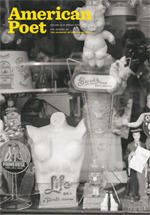 At least I'll see Thomas Sayers Ellis in New York. He is joining me and Yusef Komunyakaa for a reading to celebrate the redesign & release of American Poet on Thursday, April 26 at the DUMBO powerHouse Arena. With that lineup, it's gonna be epic.
At least I'll see Thomas Sayers Ellis in New York. He is joining me and Yusef Komunyakaa for a reading to celebrate the redesign & release of American Poet on Thursday, April 26 at the DUMBO powerHouse Arena. With that lineup, it's gonna be epic.
Anyway, back to DC and April 30. A funny thing has happened ...Tracy K. Smith won the Pulitzer for Life on Mars. Go Tracy! So not only is this the place to be, you better get your tickets in advance. If you want a sneak peek of what you might expect, here's a report from their initial reunion reading in Chicago.
O.B. Hardison Poetry Series presents“Nothing Personal: The Dark Room Collective Reunion Reading Tour”
Renowned African American Poets Look Back on 25 years
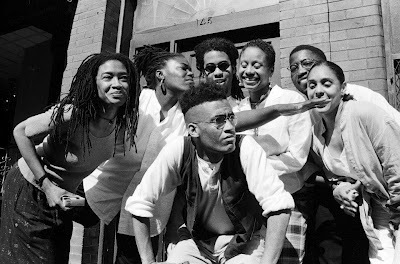
(WASHINGTON, DC) The O.B. Hardison Poetry Series at the Folger Shakespeare Library presents an evening of poetry with The Dark Room Collective on Monday, April 30 at 6:30pm. Nothing Personal features Collective members Tisa Bryant, Thomas Sayers Ellis, Major Jackson, John Keene, Tracy K. Smith, Sharan Strange, Natasha Trethewey, and Kevin Young. In 1996 The New Yorker deemed them “…a group that could turn well out to be as important to American letters as the Harlem Renaissance.” The evening will also include a discussion moderated by Meta DuEwa Jones and a reception with book sales and signing. Tickets are $15 for adults and $7.50 for students and may be purchased at Folger box office, 202.544.7077, or online at www.folger.edu/poetry.
Founded in Boston in 1987 by Thomas Sayers Ellis and Sharan Strange, The Dark Room Collective began as an informal community of African American poets. Poet and member Major Jackson described the Collective as “a group of aspiring black writers and artists who spanned outwards with large arms to embrace any black writer who had a sophistication and commitment to art and artfulness.” The group has gone on to distinguished careers, winning awards and marking literary achievements for their exuberant works.
Tisa Bryant works with innovative hybrid formats, including essays, prose poetry, cinematic novels, and ekphrastic writing. She explores the relationships between artist, art, and viewer with a focus on ethnicity, sexuality, identity, and myth. She wrote Unexplained Presence and Tzimmes, and is co-editor of War Diaries, an anthology of black gay male desire and survival, which was nominated Best LGBTQ anthology by the LAMBDA Literary Awards. She is a faculty member at California Institute of the Arts.
Multi-talented Thomas Sayers Ellis is a poet, photographer, and co-founder of The Dark Room Collective. “The fine and noble tradition of protest poetry is in safe, strong hands with this latest collection,” wrote the New York Journal of Books about Ellis’ recently published SKIN, INC.: Identity Repair Poems. Ellis is the author of The Maverick Room, which won the John C. Zacharis First Book Award, and was a recipient of a Mrs. Giles Whiting Writers’ Award. Ellis is an assistant professor at Sarah Lawrence College, a faculty member of the Lesley University, and a Caven Canem faculty member.
With his story-telling poetry, Major Jackson celebrates the complexities and subtleties of the American landscape, its people, and their environment. He has written several collections of poetry, including Hoops and Leaving Saturn, which was winner of the Cave Canem Poetry Prize and finalist for a National Book Critics Circle Award. Jackson is a professor at University of Vermont and a core faculty member of the Bennington Writing Seminars. He serves as the poetry editor of the Harvard Review.
John Keene explores identity and its many facets, from race and social class to sexuality, with the rhythmic craft of his poetry and prose. He is the author of the award-winning novel Annotations and of the poetry collection Seismosis. He has received many fellowships, a 2005 Whiting Foundation Award in Fiction and Poetry, and a 2008 Fellowship for Distinguished First Collection from the inaugural Pan-African Literary Forum. He is an associate professor of English and African American studies at Weinberg College of Arts & Sciences, Northwestern University.
Tracy K. Smith’s poetry questions love, loss, and social justice, as well as examining God, death, and the impact people have on each other and the planet. She has written three books of poetry: Life on Mars, Duende, and The Body's Question. Smith is the recipient of the 2002 Cave Canem Poetry Prize, a 2004 Rona Jaffe Writers Award, a 2005 Whiting Award, and the 2006 James Laughlin Award of the Academy of American Poets, and was Literature protégé of the Rolex Mentor and Protégé Arts Initiative. She is an assistant professor or creative writing in the Lewis Center for the Arts at Princeton University.
With Southern wit and direct eloquence, poet Sharan Strange describes the beauty and pain of life, family, neighborhood, childhood wonder, and innocence lost. Strange, a co-founder of The Dark Room Collective and a contributing and advisory editor of Callaloo, is the author of Ash, a collection of poems. Strange has been a writer-in-residence at Fisk University, Spelman College, the University of California at Davis, and the California Institute of the Arts. She is a professor of English at Spelman College in Atlanta, Ga.
Pulitzer Prize winner Natasha Trethewey writes about the working-class in the South, showing personal journeys in the landscape of history, and drawing on her own experiences for enrichment. Her first collection of poetry, Domestic Work, was the winner of the Cave Canem Poetry Prize for the best first book by an African American poet and won both the 2001 Mississippi Institute of Arts and Letters Book Prize and the 2001 Lillian Smith Award for Poetry. Trethewey’s other works include Native Guard, which received the Pulitzer Prize for Poetry, Bellocq's Ophelia and a book of creative non-fiction, Beyond Katrina: A Meditation on the Mississippi Gulf Coast. She is a professor of English at Emory University.
Kevin Young draws inspiration from African American music and American history in his poetic tales full of sorrow and insight. The New York Times Book Review described his book Black Maria as “highly entertaining, often dazzling, and, as book reviewers like to say—but rarely about contemporary poetry—compulsively readable.” Young has written seven books of poetry, including Ardency: A Chronicle of the Amistad Rebellion and Jelly Roll: A Blues, which was a finalist for the National Book Award and the Los Angeles Times Book Prize, and winner of the Paterson Poetry Prize. He is a professor of creative writing and English, and curator of Literary Collections and the Raymond Danowski Poetry Library at Emory University in Atlanta.
Moderater Meta DuEwa Jones, Ph.D specializes in poetry of the 20th and 21st centuries, particularly in relation to gender, sexuality, performance, and music. Her book, The Muse is Music: Jazz Poetry From the Harlem Renaissance to Spoken Word, was noted as “an important addition to the growing literature about jazz poetry” by Choice. Jones is co-director of the Texas Institute for Literary and Textual Studies, as well as an associate professor of English and African American studies at University of Texas at Austin.
DATE & TIME: Monday, April 30 at 6:30pm
LOCATION: Folger Shakespeare Library
201 East Capitol Street, SE, Washington, DC
TICKETS: $15 adults / $7.50 students
Purchase at the Folger box office, 202.544.7077, or www.folger.edu/poetry
METRO: Capitol South (blue/orange lines), 4 blocks
PARKING: Street parking in neighborhood

 At least I'll see Thomas Sayers Ellis in New York. He is joining me and Yusef Komunyakaa for a reading to celebrate the redesign & release of American Poet on Thursday, April 26 at the DUMBO powerHouse Arena. With that lineup, it's gonna be epic.
At least I'll see Thomas Sayers Ellis in New York. He is joining me and Yusef Komunyakaa for a reading to celebrate the redesign & release of American Poet on Thursday, April 26 at the DUMBO powerHouse Arena. With that lineup, it's gonna be epic. Anyway, back to DC and April 30. A funny thing has happened ...Tracy K. Smith won the Pulitzer for Life on Mars. Go Tracy! So not only is this the place to be, you better get your tickets in advance. If you want a sneak peek of what you might expect, here's a report from their initial reunion reading in Chicago.
O.B. Hardison Poetry Series presents“Nothing Personal: The Dark Room Collective Reunion Reading Tour”
Renowned African American Poets Look Back on 25 years

(WASHINGTON, DC) The O.B. Hardison Poetry Series at the Folger Shakespeare Library presents an evening of poetry with The Dark Room Collective on Monday, April 30 at 6:30pm. Nothing Personal features Collective members Tisa Bryant, Thomas Sayers Ellis, Major Jackson, John Keene, Tracy K. Smith, Sharan Strange, Natasha Trethewey, and Kevin Young. In 1996 The New Yorker deemed them “…a group that could turn well out to be as important to American letters as the Harlem Renaissance.” The evening will also include a discussion moderated by Meta DuEwa Jones and a reception with book sales and signing. Tickets are $15 for adults and $7.50 for students and may be purchased at Folger box office, 202.544.7077, or online at www.folger.edu/poetry.
Founded in Boston in 1987 by Thomas Sayers Ellis and Sharan Strange, The Dark Room Collective began as an informal community of African American poets. Poet and member Major Jackson described the Collective as “a group of aspiring black writers and artists who spanned outwards with large arms to embrace any black writer who had a sophistication and commitment to art and artfulness.” The group has gone on to distinguished careers, winning awards and marking literary achievements for their exuberant works.
Tisa Bryant works with innovative hybrid formats, including essays, prose poetry, cinematic novels, and ekphrastic writing. She explores the relationships between artist, art, and viewer with a focus on ethnicity, sexuality, identity, and myth. She wrote Unexplained Presence and Tzimmes, and is co-editor of War Diaries, an anthology of black gay male desire and survival, which was nominated Best LGBTQ anthology by the LAMBDA Literary Awards. She is a faculty member at California Institute of the Arts.
Multi-talented Thomas Sayers Ellis is a poet, photographer, and co-founder of The Dark Room Collective. “The fine and noble tradition of protest poetry is in safe, strong hands with this latest collection,” wrote the New York Journal of Books about Ellis’ recently published SKIN, INC.: Identity Repair Poems. Ellis is the author of The Maverick Room, which won the John C. Zacharis First Book Award, and was a recipient of a Mrs. Giles Whiting Writers’ Award. Ellis is an assistant professor at Sarah Lawrence College, a faculty member of the Lesley University, and a Caven Canem faculty member.
With his story-telling poetry, Major Jackson celebrates the complexities and subtleties of the American landscape, its people, and their environment. He has written several collections of poetry, including Hoops and Leaving Saturn, which was winner of the Cave Canem Poetry Prize and finalist for a National Book Critics Circle Award. Jackson is a professor at University of Vermont and a core faculty member of the Bennington Writing Seminars. He serves as the poetry editor of the Harvard Review.
John Keene explores identity and its many facets, from race and social class to sexuality, with the rhythmic craft of his poetry and prose. He is the author of the award-winning novel Annotations and of the poetry collection Seismosis. He has received many fellowships, a 2005 Whiting Foundation Award in Fiction and Poetry, and a 2008 Fellowship for Distinguished First Collection from the inaugural Pan-African Literary Forum. He is an associate professor of English and African American studies at Weinberg College of Arts & Sciences, Northwestern University.
Tracy K. Smith’s poetry questions love, loss, and social justice, as well as examining God, death, and the impact people have on each other and the planet. She has written three books of poetry: Life on Mars, Duende, and The Body's Question. Smith is the recipient of the 2002 Cave Canem Poetry Prize, a 2004 Rona Jaffe Writers Award, a 2005 Whiting Award, and the 2006 James Laughlin Award of the Academy of American Poets, and was Literature protégé of the Rolex Mentor and Protégé Arts Initiative. She is an assistant professor or creative writing in the Lewis Center for the Arts at Princeton University.
With Southern wit and direct eloquence, poet Sharan Strange describes the beauty and pain of life, family, neighborhood, childhood wonder, and innocence lost. Strange, a co-founder of The Dark Room Collective and a contributing and advisory editor of Callaloo, is the author of Ash, a collection of poems. Strange has been a writer-in-residence at Fisk University, Spelman College, the University of California at Davis, and the California Institute of the Arts. She is a professor of English at Spelman College in Atlanta, Ga.
Pulitzer Prize winner Natasha Trethewey writes about the working-class in the South, showing personal journeys in the landscape of history, and drawing on her own experiences for enrichment. Her first collection of poetry, Domestic Work, was the winner of the Cave Canem Poetry Prize for the best first book by an African American poet and won both the 2001 Mississippi Institute of Arts and Letters Book Prize and the 2001 Lillian Smith Award for Poetry. Trethewey’s other works include Native Guard, which received the Pulitzer Prize for Poetry, Bellocq's Ophelia and a book of creative non-fiction, Beyond Katrina: A Meditation on the Mississippi Gulf Coast. She is a professor of English at Emory University.
Kevin Young draws inspiration from African American music and American history in his poetic tales full of sorrow and insight. The New York Times Book Review described his book Black Maria as “highly entertaining, often dazzling, and, as book reviewers like to say—but rarely about contemporary poetry—compulsively readable.” Young has written seven books of poetry, including Ardency: A Chronicle of the Amistad Rebellion and Jelly Roll: A Blues, which was a finalist for the National Book Award and the Los Angeles Times Book Prize, and winner of the Paterson Poetry Prize. He is a professor of creative writing and English, and curator of Literary Collections and the Raymond Danowski Poetry Library at Emory University in Atlanta.
Moderater Meta DuEwa Jones, Ph.D specializes in poetry of the 20th and 21st centuries, particularly in relation to gender, sexuality, performance, and music. Her book, The Muse is Music: Jazz Poetry From the Harlem Renaissance to Spoken Word, was noted as “an important addition to the growing literature about jazz poetry” by Choice. Jones is co-director of the Texas Institute for Literary and Textual Studies, as well as an associate professor of English and African American studies at University of Texas at Austin.
DATE & TIME: Monday, April 30 at 6:30pm
LOCATION: Folger Shakespeare Library
201 East Capitol Street, SE, Washington, DC
TICKETS: $15 adults / $7.50 students
Purchase at the Folger box office, 202.544.7077, or www.folger.edu/poetry
METRO: Capitol South (blue/orange lines), 4 blocks
PARKING: Street parking in neighborhood
Published on April 19, 2012 06:59
April 11, 2012
Cinco de Sandra & the Joy-Schmuck Club
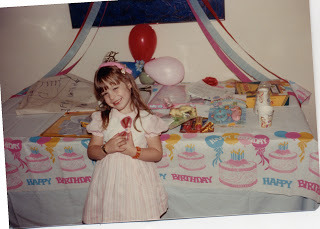
This is me. I like birthdays.
But without going into too much detail: I did not have the best birthday last year. I was nursing a broken heart (from just a week before, no less, which had meant a looong drive back from Mississippi). I didn't treat myself a fancy sushi dinner. I didn't get a good glass of wine with a friend. I walked the grounds of the Hillwood Museum, stopped to sniff every flower I saw, and stayed very very quiet.
That's not gonna be the case this year.
Because this year, my friends, we are having an extravaganza. You are invited. And through no fault of my own, we are calling it...
CINCO DE SANDRA
On May 5, 2012, an all-star lineup of DC and NYC storytellers will come together to blow your mind with live performances of poetry, comix, and stories at the Hillyer Art Space in Dupont Circle. Venues represented include Trip City, ACTIVATEcomix, and Barrelhouse. After that? We'll get the music spinning.
CINCO DE SANDRA's lineup of performers includes:
Dean Haspiel Emmy winner for BORED TO DEATH title sequence, artist of THE ALCOHOLIC w/Jonathan Ames and THE QUITTER w/Harvey Pekar, creator of BILLY DOGMA
Molly Lawless Cartoonist of HIT BY PITCH, FROG & OWL
Jim Dougan Comics writer, SAM & LILAH, CRAZY PAPERS, others at ACTIVATEcomix
Jennifer TressDC-based storyteller, author of YOU'RE NOT PRETTY ENOUGH
Natalie E. Illum Spoken word poet, mothertongue organizer
Tony Mancus BARRELHOUSE contributor and co-editor of Flying Guillotine Press
& yes, little 'ol me, quite possibly in Modern Alice mode*
The whole shebang will be hosted by man-about-town Brandon Wetherbee (of YOU, ME, THEM, EVERYBODY) and featuring the sweet sounds of DJ P-Vo (Hometown Sounds DC).
We will have a merch table. We will have beer and non-beer. We will have a helluva lotta hijinks. We're asking $5 contributions at the door to defray the cost of the space, and to keep an eye on the head count, we're asking that you RSVP here (feel free to invite friends, too!). Beyond that, the only thing we're asking of you is to have an awesome time.
*Don't tell my mom.
This event is hosted and coordinated by International Arts & Artists, LLC. Anyone familiar with the Hillyer Art Space (9 Hillyer Court NW) knows this is a FABULOUS venue--right off Dupont Circle down the alley from the Phillips Collection, accessible to metro and bus lines. Seriously, if there's one thing you go to in May, make this it. Doors open at 8 PM.
And while I have your attention, this contest should intrigue TRIP CITY fans...
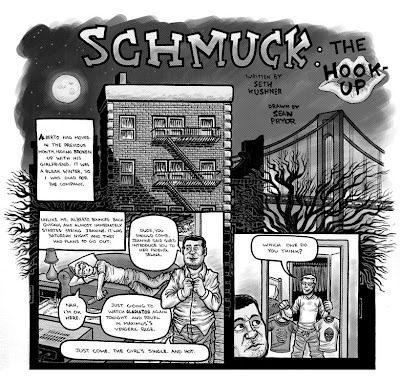
SETH KUSHNER SAYS: SEND YOUR SCHMUCKIEST STORY
Send your schmuckiest, most happless, awkward, embarrassing and/or clumsy personal story, 800 words or less, by May 7.
Seth Kushner will pick the top three, which will then be read by a jury comprised of Emmy Award winning cartoonist, Dean Haspiel (Bored To Death, Billy Dogma), Eisner award winning cartoonist Nick Abadzis, (Laika, Hugo Tate), and poet/author Sandra Beasley (Don't Kill The Birthday Girl, I Was the Jukebox) who will pick the first, second and third place winners. All will be published on TripCity.net, one per month, from least schmucky to most schmucky, between June and August.
The following prizes will be awarded:
1st Place – Signed copy of Leaping Tall Buildings: The Origins of American Comics by Christopher Irving and Seth Kushner
2nd Place – Signed copy of Seth Kushner's limited edition CulturePOP Photocomix
3rd Place – Signed copy of the TRIP CITY Visitor Guide
Please, amateur schmucks only—no pros!!
PLEASE EMAIL ALL ENTRIES TO: tripcityinfo@gmail.com
Click here to read SCHMUCK, Seth Kushner's "comix neurotica" at TRIP CITY...
THE JURY
Emmy-award-winning artist Dean Haspiel created the Eisner Award nominated "Billy Dogma," and illustrated for HBO's "Bored To Death." Dino has drawn many superhero and semi-autobiographical comic books and graphic novels for major publishers, including collaborations with Jonathan Lethem, Harvey Pekar, Jonathan Ames, Inverna Lockpez, and Tim Hall. Dino won the 6th Anniversary Literary Death Match in NYC with his "brute charisma" and curates cool multimedia at TripCity.net
Sandra Beasley is the author of I Was the Jukebox (winner of the Barnard Women Poets Prize), Theories of Falling (winner of the New Issues Poetry Prize), and Don't Kill the Birthday Girl: Tales from an Allergic Life, a memoir. Her essays have appeared in the Oxford American and Washington Post Magazine. Her poetry has turned up in such venues as The Believer, Slate, and The Best American Poetry 2010. She keeps her heart in a suitcase and her groceries in Washington, DC.
Nick Abadzis is a cartoonist, writer, graphic novelist and editor of international renown who has been honored with various awards including the prestigious Eisner in 2008 for his graphic novel Laika. He recently relocated from London in the UK to New York City where he continues to work both as a storyteller and editorial consultant. His next major project is a revamped and digitally-restored collection of his first ever strip Hugo Tate, originally published in legendary UK music and comics magazine Deadline. This will be published by Blank Slate Books in 2012, and other graphic novels are in the works.
Seth Kushner's photography has appeared in The New York Times Magazine, Time, Newsweek, L'Uomo Vogue, The New Yorker and others. He was chosen by Photo District News magazine as a three-time winner of their Photo Annual Competition. Seth's first book, The Brooklynites (with Anthony LaSala) was published by powerHouse Books in 2007. His next book, Leaping Tall Buildings: The Origins of American Comics (with Chris Irving) will be released in May 2012.
#
...who knows? Get crazy on May 5 and it might just give you a story for May 7...
Published on April 11, 2012 13:05



